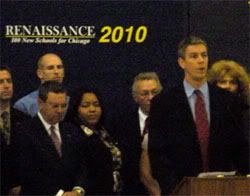When it Comes to Education, Democrats Hate Democracy
Late last month, Obama's Secretary of Education Arne Duncan came out swinging against elected school boards:
Education Secretary Arne Duncan said Tuesday that mayors should take control of big-city school districts where academic performance is suffering.
Duncan said mayoral control provides the strong leadership and stability needed to overhaul urban schools.
[...]
He acknowledged Baltimore schools chief Andres Alonso, asking how many superintendents the city had in the past 10 years. The answer was seven."And you wonder why school systems are struggling," Duncan said. "What business would run that way?"
After the forum, Duncan told The Associated Press that urban schools need someone who is accountable to voters and driving all of a city's resources behind children.
"Part of the reason urban education has struggled historically is you haven't had that leadership from the top," he said.
 In a sense, I can understand his motivation: as head of Chicago Public Schools, he was a direct recipient of abrogated school board power. The democratic, decentralized, and much-lauded Local School Council system in Chicago (which was created in the late 80s through tireless grassroots community organizing against the very bureaucracy Duncan would end up running) was systematically gutted and ignored under his tenure. It also isn't surprising that his main line of attack is that institutions of learning and governance aren't run enough like businesses. Duncan's Renaissance 2010 program was written and handed to him by the big business players in Chicago and elsewhere.
In a sense, I can understand his motivation: as head of Chicago Public Schools, he was a direct recipient of abrogated school board power. The democratic, decentralized, and much-lauded Local School Council system in Chicago (which was created in the late 80s through tireless grassroots community organizing against the very bureaucracy Duncan would end up running) was systematically gutted and ignored under his tenure. It also isn't surprising that his main line of attack is that institutions of learning and governance aren't run enough like businesses. Duncan's Renaissance 2010 program was written and handed to him by the big business players in Chicago and elsewhere.
Now the Center for American Progress, through its panoply of blogs, is pushing the idea with some help with Mayor Bloomberg. Both CAP's Wonk Room and Matthew Yglesias blogs talked up the idea that really, having fewer elected officials means more democracy. Tom Vander Ark at the Huffington Post called what little democratic control we have over our schools to be a "strange historical remnant." Yglesias took the idea and ran with it, all the way to its monarchical end:
I think this is part of a larger issue about getting democracy right in the United States. There was an assumption, at one time, that you could make government more democratic and accountable by, in essence, multiplying the number of elected officials.
In retrospect, I think this was based on flawed logic and faulty assumptions that forgot to account for the fact that people have a limited amount of time they’re realistically going to spend monitoring public officials.
[...]
I think part of the answer is that states should probably adopt unicameral legislatures and consider cutting down on the number of independently elected statewide officials. But cutting down on the quantity and influence of hyper-local electeds and putting responsibility in the hands of visible figures like the mayor and city council is crucial.
Apparently Bloomberg did an interview for ThinkProgress, part of which featured him extoling the virtues of dictatorial control over schools, teachers, and students, with the help of bogus, cooked numbers:
My favorite part is near the end, when he says: “...you could literally end democracy as we know it here in this country… without an educated public. And when you have these school boards that are fundamentally controlled by special interests, the truth of the matter is that students come last, if at all.” Fewer elected officials = more democracy! It all makes perfect sense now!
Thankfully, regular readers largely countered and ridiculed such a position:
The flipside of Matt’s point is that when a single local elected executive is responsible for EVERYTHING, it’s pretty hard to hold him or her accountable for any specific thing. If you like what Bloomberg’s doing with, say, public safety and housing but don’t like his education policies, how do you hold him accountable? You can’t cast half a vote. On the other hand, a school board subject to being voted out of office can be held accountable.
And one of the commenters actually mentions what progressive reform of our school systems would look like:
The other kind of reform that is possible is to empower parents and teachers, but in order to do that you don’t need to gather power into the office of the mayor- you need to distribute power into the neighborhoods, families, and classrooms.
Another tip-off is the exaggerated concern about the “special interests”. Matt isn’t talking here about the textbook publishers and computer sellers- a mayor who doesn’t know anything about education isn’t going to tangle with those “experts”. And he isn’t talking about the real estate industry that wants to keep school taxes low- no mayor is going to try to trim the horns of the real estate barons.
No, when Matt is talking about “special interests” he’s referring to teachers and parents. Transfer the powers of the school board to the mayor’s office and those “special interests” will have just as much influence as the rest of us in an election- which is to say, none.
Authoritarian, bureaucratic schools are a bipartisan affair in politics - which means it's going to take a lot more than mere elections to reclaim our country's educational systems.